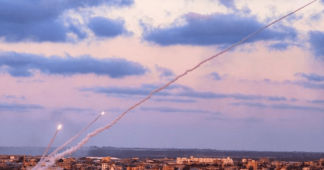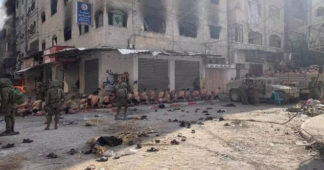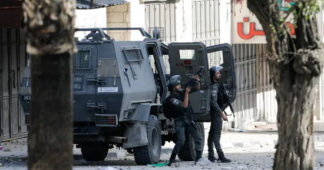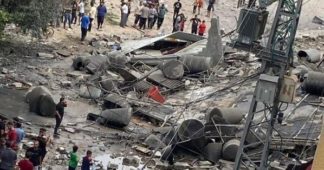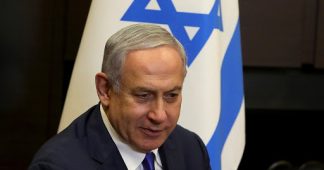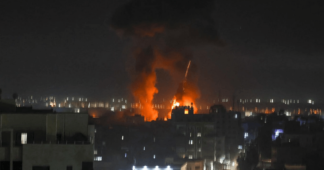The war in Gaza was front and centre of Israel’s Purim celebrations, when children dressed as soldiers pretended to kill Palestinians.
Mar.25, 2024
Celebrations for the Jewish holiday of Purim, which were held in Israel over the weekend, were marred by multiple instances of Israelis “celebrating” the killing of Palestinians in Gaza, videos and photos have shown.
The Jewish festival of Purim was held this year from sunset on 23 March to nightfall the following day by Jews around the world.
The festival is usually celebrated through various rituals that include dressing up, exchanging food, donating to the poor, and public recitations of the Scroll of Esther, which form part of the Hebrew bible.
But this year’s Purim costumes and role-play were heavily influenced by Israel’s ongoing war in Gaza, where 32,333 Palestinians have been killed.
Several images posted on social media show children dressed as Israeli soldiers carrying guns and parading the streets in fake army tanks, apparently celebrating the Israeli offensive on Gaza, with some taking part in mock-executions.
Another video shows two Israelis entering a room dressed as members of Zaka – an emergency response organisation with close ties to ultra-orthodox movements – carrying a fake corpse wrapped in a body bag, symbolising the victims of the 7 October attacks.
Meanwhile, Israeli artists set up a fake “Hamas tunnel” in Tel-Aviv for Purim.
The installation, which was presented as an initiative to raise awareness for the Israeli hostages held in Gaza, attracted visitors including children dressed up as soldiers.
Dozens of families also posted pictures of their children dressed as Israeli soldiers online, as a show of support for the army in Gaza.
Others celebrate by dressing in costumes, although some have criticised the fancy dress chosen by Israelis as culturally insensitive or racist.
But these images, which went viral over the weekend, sparked concerns among many observers online, some of whom warned that the skits and costumes seen this year attempted to dehumanise Palestinians as part of a broader genocidal process.
Videos of teenagers singing the controversial “Harbu Darbu” song, by Israeli musicians Ness and Stilla, drew a lot of concern.
The song, which made it to the top of Israeli streaming platforms in November 2023, has been described as a ‘genocidal’ song by many observers due to its Hebrew lyrics that explicitly call for the killing of Hamas members but also Arab public figures and celebrities.
The Purim holiday commemorates the saving of the Jewish people from annihilation at the hands of an official of the Achaemenid Empire (modern-day Iran), named Haman.
But it has been explicitly re-interpreted by Israeli authorities as a celebration of Israel’s strength and its ability to defeat Hamas in the context of the current war.
“We will enter Rafah and achieve total victory. We eliminated Haman and we will also eliminate Sinwar,” Benjamin Netanyahu said in a Purim speech re-tweeted by the official account of Israel’s Prime Ministry.
It is impossible to defeat the sheer evil by leaving it intact in Rafah. As in ancient times, we are also united. We are fighting and will be victorious. We will enter Rafah and achieve total victory. We eliminated Haman and we will also eliminate Sinwar.
Happy holiday to you! pic.twitter.com/KoxWiRQQHK
— Prime Minister of Israel (@IsraeliPM) March 24, 2024
But Netanyahu’s speech has sinister undertones.
As multiple observers highlighted, including Israelis who oppose Israel’s war on Gaza, in the Hebrew Bible the story of Purim ends with the Jewish people massacring 75,000 of its enemies.
Many social media users have drawn parallels with the situation in Gaza today where over 32,000 Palestinians have been killed and that massacre.
Netanyahu’s speech also rang hollow in New York City, where several Orthodox communities uploaded videos of anti-Zionist Jews burning the Israeli flag on Purim.
Similar scenes have already taken place in recent years, reflecting these communities’ religious beliefs that Jewish people should not have a state of their own until the coming of a Messiah.
While the Purim celebrations unfolded in Israel, Christians in Gaza celebrated Palm Sunday only a few dozen kilometers away – praying for peace under the bombs.
The faithful walked slowly in a procession past the stone facade of Gaza's only Catholic church on Palm Sunday, gathering to pray for peace as war raged around them https://t.co/k84yvxVNTl
— AFP News Agency (@AFP) March 24, 2024
We remind our readers that publication of articles on our site does not mean that we agree with what is written. Our policy is to publish anything which we consider of interest, so as to assist our readers in forming their opinions. Sometimes we even publish articles with which we totally disagree, since we believe it is important for our readers to be informed on as wide a spectrum of views as possible.
